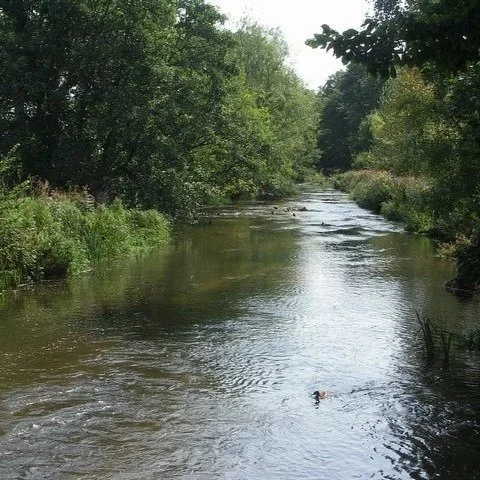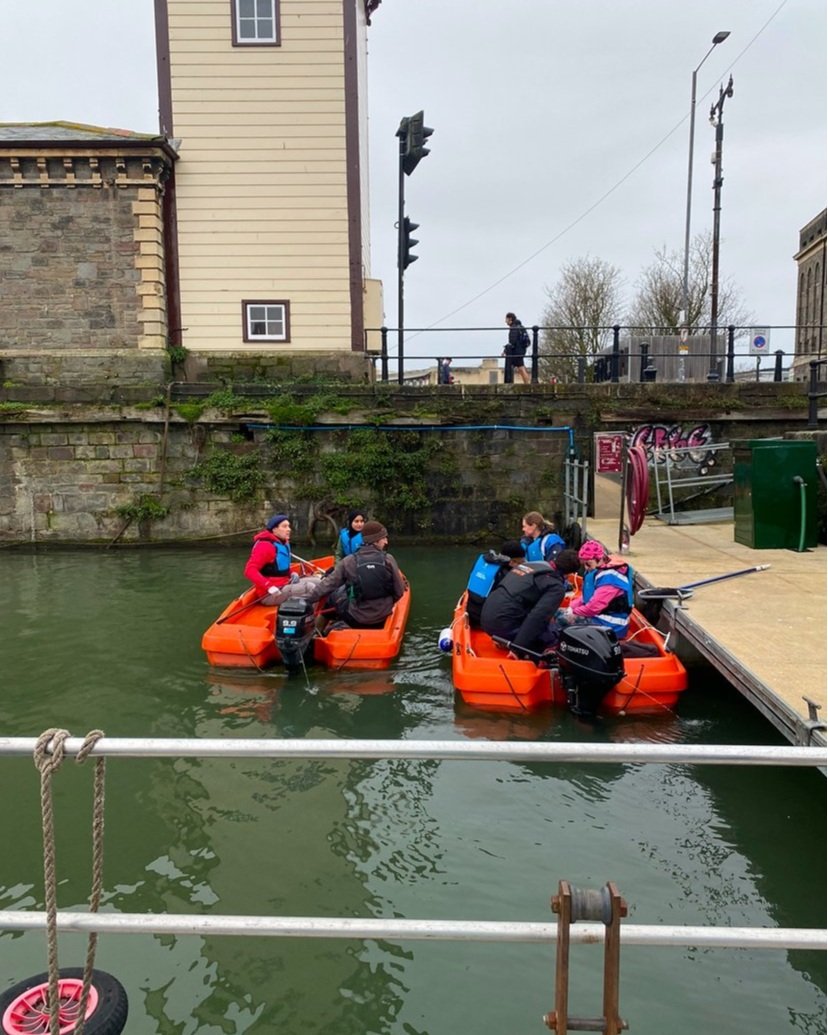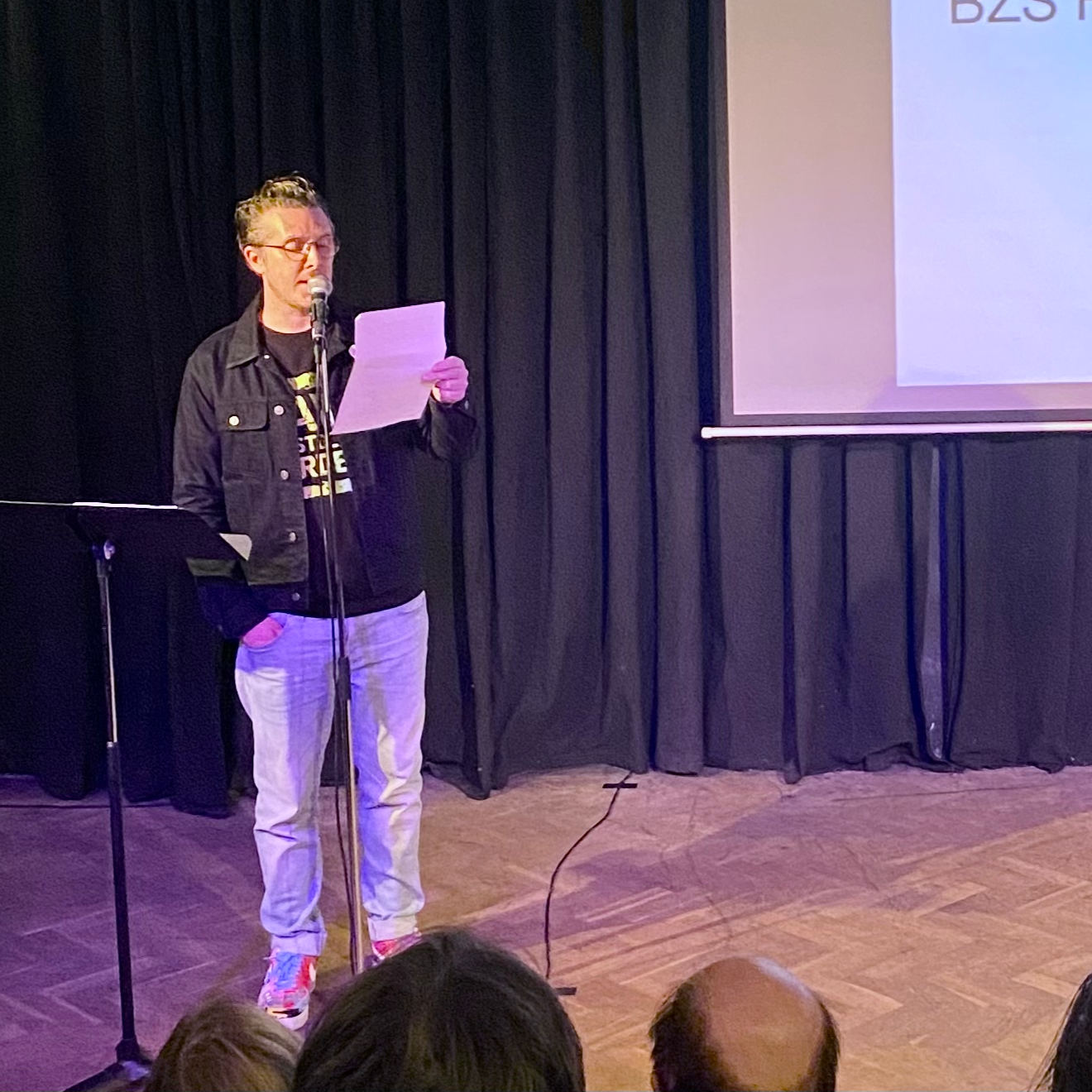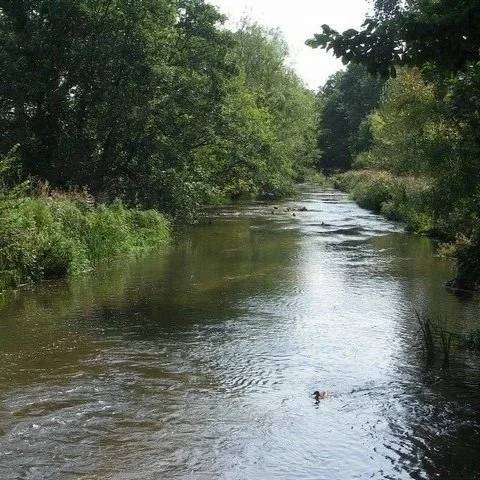IS THERE TIME TO SAVE THE RIVER FROME?
Bristol’s water pollution crisis
River Frome at Frampton. Image: Mike Smith / River Frome at Frampton
The river Frome: Then and now
The river Frome has wound its way inconspicuously beneath the streets of Bristol’s city centre since the 19th century, when it was bricked over for urban development. Despite being once vital to the city’s success in industries like milling and tanning, the hiding of the river from public view has trickled down through the centuries into its absence from the public consciousness.
This has resulted in the ‘hidden river’ becoming increasingly known in the South West as the ‘neglected river’: reports published this year by the Environment Agency show that the river suffered the equivalent of 169 days of raw sewage spills throughout 2023, with Wessex Water being blamed for outdated storm overflow infrastructure.
This comes as no surprise when in March 2024 it was revealed that Bristol is the fourth worst city for sewage spills in the UK by area density.
This year, vice-chair of the River Action campaign group, Feargal Sharkey, described the river as “essentially ecologically dead”, as citizen scientists, working on the Bristol Avon Rivers Trust’s RiverBlitz, identified high levels of pollutants.
The RiverBlitz also identified invasive plant species on the river Frome’s banks, grey (polluted) water, and the presence of physical waste, such as crisp packets and dog waste bags.
Major sources of pollution are thought to include both agricultural and urban surface run-off washing contaminants into the river, with increased rainfall due to worsening climate change exacerbating the problem.
UK Youth for Nature is a national organisation that is working to draw attention to issues of freshwater pollution and put pressure on governments and councils to develop policies for this purpose.
The UK Youth for Nature Co-Director, Ellen Bradley, said, “We all know that a horrible amount of raw sewage is being pumped into our river systems. But there are also plenty of other other things that are contributing to river pollution. Obviously, one of them being chemicals.
“In England, Wales, and Northern Ireland, no rivers are considered to be in high ecological health, and chemical pollution is one of the leading factors. Chemical pollution can come from agricultural runoff, so nutrients from fertilisers. There's also urban runoff, so pollution from roads and litter.
“Pollutants can come from many different places, like sewage, landfills, and industrial processes.”
Importance of the river Frome
The river Frome at Snuff Mills. Image: Stephanie Meadows
The river Frome benefits UK wildlife by providing vital habitats for many species, including kingfishers, bats, and otters, as well as the critically endangered European eel.
The river Frome is of particular importance as it is a chalk stream.
Ellen said, “Rivers are major biodiversity hotspots. And England is actually internationally important for chalk streams. We are home to the vast majority of the world's chalk streams and they're really internationally important habitats. They've been referred to as the English Great Barrier Reef.”
Ellen shared that there are only 200–300 of these types of waterways globally, and 85% of them are found in England.
She said, “It's a really important and precious habitat that we should absolutely be protecting. They're really, really precious habitats for lots of species that we love in the UK”.
The river also provides opportunities for local communities to improve their physical and mental health through river walks as well as fishing and birdwatching opportunities.
Ellen said, “People like rivers. People love going cold water swimming or fishing. People have a significant connection with freshwater habitats in the UK and actually, if they are polluted and damaged, it means that we're not going to be enjoying them. It's not just about the wildlife”.
The river Frome acts as a key flood defence and many sites along its banks hold important historical and cultural significance.
The question now is can the river Frome recover from decades of neglect, or have we passed a tipping point for recovery?
What’s in the Water?
The latest data from the Environment Agency’s Water Quality Archive, which operates under the government’s Department for Environment, Food & Rural Affairs (DEFRA), provides deeper insight into the current state of the River Frome. The levels of different pollutants are recorded, among other metrics such as river oxygen levels and temperature, on an almost monthly basis.
I analysed data from the Environment Agency’s monitoring point closest to central Bristol, located at Wade Street in St Jude’s.
While the average yearly values of some metrics have remained relatively stable since the records were first established in 2000, with values for some measures of pollution even decreasing, four key metrics show alarming recent trends.
Ammonia pollution
Between 2022 and 2024, the concentration of ammonia in the river Frome has nearly tripled. High concentrations of ammonia in rivers cause toxicity and death in fish and invertebrates, as well as to their eggs and larvae, reducing population sizes. They can also create ‘dead zones’ where there is too little oxygen in the water for species to survive.
If the current increasing trend in ammonia concentration continues, then we can expect to see slight impacts on river Frome wildlife by 2027, escalating to overall ecological health decline within the following 10 years.
Trends in pollution metrics from 2022 to 2024 in the River Frome. Source: Environment Agency Water Quality Archive, Department for Environment, Food & Rural Affairs.
Organic pollution
Another metric of concern is BOD ATU, which essentially measures the level of organic pollution in the river. This value has increased by more than a third since last year. Based on this metric, the water quality of the river Frome has fallen from ‘Good’ to ‘Moderate’, based on the standards of the Water Framework Directive, in just one year, meaning that the ecological quality of the river has declined in a very short space of time.
This is the first time that the status of this metric has been downgraded since these records began in 2000. If this trend continues, we can expect the river Frome to be classified as ‘Poor’ in as early as 2025, meaning the absence of a large amount of typical river wildlife, the presence of algal blooms, and severe ecological degradation. Following this trend, by 2029, the river would be considered ‘Bad’, meaning that it would have little to no ecological value remaining.
The orthophosphate level has been considered to indicate ‘Moderate’ river quality since these data recordings began in 2000 (with the exemption of 2016, when it fell within the ‘Good’ range). This indicates that the river Frome has, for many years, suffered from high levels of phosphate pollution. The ‘Moderate’ status that has been assigned indicates a decrease in biodiversity as well as an increase in the presence of algal blooms.
Suspended solids pollution
The average value for Sld Sus @ 105°C for 2024, which essentially measures the concentration of suspended solids in the water, has moved the water quality status from ‘Good’ to ‘Moderate’. Suspended solids include soil, algae, organic matter, and even industrial waste.
An increase in the concentration of this metric can indicate a variety of concerning situations, such as excess sedimentation smothering fish spawning grounds, reduced light reaching aquatic plants, in turn reducing oxygen levels, and toxic chemicals entering the food chain. Although these events can be caused by heavy rainfall, they can also be triggered by human activities, such as agricultural runoff, raw sewage spills, and construction activities.
The value for Cond @ 25°C, which essentially indicates the electrical conductivity of water, has slowly crept up since 2017, suggesting a gradual increase in the amount of pollution present in the river.
The big picture
The good news is that besides the metrics above that have been assigned “Moderate” or “Good” status, all of the other 40+ measured metrics have been assigned the status “High”, meaning that these values are not concerning when it comes to them contributing to the pollution of the river Frome.
However, the corresponding river quality status for each metric being measured is assigned according to the Water Framework Directive standards. They employ a "one out, all out" principle, meaning that the overall quality of the river is determined based on the lowest status rating given to any of the elements being measured. For the river Frome, this means that the overall quality status of the river is “Moderate”, due to both the BOD OTU and orthophosphate levels.
Impact on wildlife and ecology
Critically endangered European eel (Anguilla anguilla). Photo licensed from Canva.
This means that the river Frome is significantly impacted by human activity, and that sensitive species are struggling to survive in the river or are entirely absent from it.
For example, young Atlantic salmon numbers have reached record lows in the river Frome due to agricultural run-off and nutrient pollution.
The European eel, once common in the river Frome, is now critically endangered. This is in part due to raw sewage spills into the river as well as the presence of plastic pollution.
Other sensitive species, such as otters, kingfishers, and bats, are at risk.
Nine miles upstream from where the Environment Agency’s pollution measurements were taken near central Bristol, the agency has also been studying the ecology of a 6-mile stretch of the river Frome. The transect begins near Old Sodbury and ends at Frampton Cotterell, the area where most raw sewage spills into the river Frome occurred in 2023.
The data collected shows a striking decline in the river’s ecology, with ecological rankings ranging from moderate to high in 2009–2019. This changes drastically in 2022, when both the classification status for fish and the overall ecological status of the river changes from ‘Moderate’ to ‘Poor’.
Reasons given for the decline in the fish rating were urban development and the disruption of ecological processes. Although the Environment Agency has stated that the objective for 2027 involves improving the fish classification to ‘Good’, it also states that they have low confidence that they’ll hit this target as it would be ‘Disproportionately expensive’ and involve ‘Disproportionate burdens’.
Chemical classifications that were once classified as ‘Good’ in 2013–2016 took a nosedive in 2019, with the overall chemical classification, including priority hazardous substances such as mercury, being assigned as ‘Fail’.
In subsequent years, chemical classification does not appear to have been undertaken, with the entry for 2022 simply stating ‘Does not require assessment’.
What needs to happen now
The good news is that the data above suggests that there is time to save the river Frome. The river is not yet classified as being in a ‘Poor’ or ‘Bad’ state, meaning that it is not yet ecologically dead. An ecologically dead river is one which is no longer able to support life.
In order to save the river from further ecological degradation, metrics performing poorly must be addressed and worrying pollution trends must be curtailed.
With this aim in mind, key areas to address are the spilling of raw sewage, agricultural runoff, urban runoff, erosion, and habitat degradation.
There are various ways to tackle these. For example, agricultural runoff can be reduced by introducing buffer zones between where fertilisers are applied and animals are permitted to go and the river itself. It may also be possible to reduce the use of damaging fertilisers by introducing more environmentally friendly methods of pest control.
Raw sewage spills can be decreased by the introduction of upgraded water infrastructure and introducing fines to water companies who pollute waterways.
Improving habitats along the riverbanks (riparian habitats) could decrease their degradation which can reduce the levels of suspended sediments in the river as well as provide foliage for pollutant filtration.
What is already being done to save the river Frome
Bristol City Hall. Image: Stephanie Meadows
There are positive steps already being made to save the river Frome. At a full council meeting on 12th November, Councillor Nicholas Coombes (Liberal Democrat, Westbury-on-Trym & Henleaze) tabled a motion to address water pollution in Bristol.
He said, “It’s now time for Bristol City Council to play our part in a river of responsibility that runs through national government, water companies, regulators, and even volunteers”.
The motion was unanimously backed across all parties, as well as by Wessex Water, the water and sewerage company serving the south-west of England, including Bristol.
Wessex Water commercial manager Julian Okoye said, “We have put forward plans to our regulator seeking their approval for a £1.6 billion programme of improvements over the next five years.”
Wessex Water have also been conducting works on areas along one of the worst-affected stretches of the river Frome in terms of raw sewage spills in Frampton Cotterell. Work began in April, with £5 million being invested into three storage tanks to collect rainwater before it reaches overflows.
In supporting the motion, Councillor Martin Fodor (Green Party, Redland) noted that in 2020, the council and its partners agreed that 100% of Bristol’s waterways should have water quality that supports healthy wildlife by 2030. However, he also pointed out that much more action is needed to reach this target.
Strides also seem to be being made at a national level, with Councillor Ellie King (Labour Party, Hillfields) outlining actions being taken by the government, including launching the largest water industry review since it was first privatised.
King added, “The water bill currently working through parliament has made clear commitments to hold water bosses to account for their impact on both customers, the services they receive, and for their impact on wildlife and the environment. under this bill, Ofwat, the water regulator, will be given new powers to block companies from paying out bonuses to their execs if they don't clean up their act, and issue severe fines and potentially imprisonment for disregarding the rules.
“Water companies will be required to publish real-time discharge information on storm overflows, bringing an unprecedented level of transparency, and new customer panels will have the power to hold bosses to account. And finally, producing pollution reduction plans will be mandatory to ensure the severity and frequency of pollution discharge can be monitored and reversed.
“Our rivers and waterways should be clean, healthy, rich in nature, good for people, and good for the environment”.
As a result of this motion passing, the Environment Policy Committee will begin work with One City Environment Board partners with the goal of developing policies that will improve water quality. Methods of water management to be explored include establishing a river pollution database and encouraging the use of water butts.
The Environment Agency’s Resilient Frome project has been running since 2021 and, as well as aiming to reduce flooding in the catchment area, is also undertaking work to improve biodiversity along the river. The project focuses on utilising nature-based solutions, such as installing storage ponds, to improve water ecology and quality.
At a smaller yet still impactful scale, the “Eels in the Classroom” project led by the Bristol Avon Rivers Trust involves the rearing of the critically endangered European eels in schools before their release in the river Frome to boost population numbers.
In 2022 the Environment Agency undertook further works to assist the eels of the river Frome. They modified four weirs to include eel tiles and baffles, which make it easier for the eels to swim upstream and reach their spawning grounds.
Local groups have also formed to improve river health throughout Bristol. One such charity groups is ‘Clean-up Bristol Harbour’, which runs monthly events on the river Avon at Bristol harbourside. Volunteers take to the river on boats or stay on the banks with litter pickers, and remove any visible waste that they find.
Abbie Wieberg, Director of Clean-up Bristol Harbour, shared that the majority of the waste is typically plastic pollution, with an increase in plastic containers, plastic bottles and drink cans over the last few years. Analysis conducted by a volunteer has even shown an uptick in microplastics pollution over a similar period.
Is there time to save the river Frome?
Clean-up Bristol Harbour volunteers getting ready to remove rubbish from the river. Image: Stephanie Meadows
Alongside raw sewage spills, urban development is one of the key sources of river pollution. At present, there are plans to build 350 homes in tower blocks up to 19 storeys high directly on the banks of the river Frome in St Jude’s in Bristol. This raises concerns for further pollution of the river Frome during construction.
Although works are taking place to upgrade storm overflow systems to reduce raw sewage spills into the river Frome, these will take time to develop and it’ll take even longer for the river to recover. However, positive impacts on water quality can typically be noted within months to a few years of sewage spills decreasing, but noticeable effects on river biodiversity, ecology, and pollution levels may not be significant for several more years.
Ongoing campaigns from groups at the national level are calling for improvements to the health of our rivers and waterways, as well as the nation’s ecology and biodiversity.
One such organisation is UK Youth for Nature, which runs a campaign called “Not so Freshwater”. This campaign focuses on agricultural and chemical pollutants, another major source of pollution for the UK’s rivers.
The campaign is calling for a 50% reduction in the volume and toxicity of pesticide use by 2030, which is in-line with what the UK government has agreed to do on an international scale at COP15.
However, UK Youth for Nature Co-Director Ellen Bradley said, “At the moment, we haven't really seen that translated into any meaningful national legislation”.
At a more local level, UK Youth for Nature run a campaign in Bristol called ‘Your Wild Streets’, which focuses on urban nature, access to urban nature, and pesticide use. Ellen Bradley explains that around 10% of pesticide use in the UK is used in urban spaces, either privately in people’s gardens or through local councils spraying streets.
These pesticides end up on urban surfaces like roads and pavements, and flow into rivers when it rains. The goal of this campaign is to see Bristol go pesticide-free.
Ellen said, “We want to see Bristol City Council join a number of other councils that have committed to phasing out or have already banned pesticides, places like Glastonbury and Newcastle.
“There has been a lot of campaigning in Bristol through the Pesticide Safe Bristol Alliance already over the last few years. And there's been a lot of promises made and enthusiasm for making Bristol pesticide-free, but actually as of yet haven’t quite got over the line. So, UK Youth for Nature is pushing for that”.
When it comes to seeing real change, Ellen emphasises that it can be slow going.
She said, “It can take a long time to actually see the tangible impacts because a lot of promises are made but actually translating that into meaningful legislation takes time. And so that's actually something that we're working on at the moment as an organisation.
“When it comes to impacting policy, it's such a strange and slow space that yes, sometimes it can take a while.”
Local community groups can have an excellent impact on improving river water quality. However, these don’t come without their own challenges.
Director of Clean-up Bristol Harbour, Abbie Wieberg, said, “Some of the biggest challenges are getting people involved. On a sunny day, you can get people down to clean up, but having that constant commitment from people is quite difficult.
“There's also difficulties regarding the administration behind organising such events with the council, and that approval process can be quite tiresome.
“There is an element that it becomes quite frustrating, as it feels a bit like you're never quite winning. There's always rubbish there, no matter what you do. There seems to be more rubbish in the harbour every single time, and it gets frustrating that you're not fixing the problem. Just a bit of a bandaid.
“There's a level of indifference that gets quite frustrating, particularly around the harbour. People will often be going on walks and we'll watch people either throw rubbish on the ground or not put it in the bin properly. And that level of indifference gets quite frustrating.”
Abbie emphasises the need for more bins around the harbour to prevent them from overflowing and rubbish being blown into the river. Her unique position means that she’s made further observations of what needs to be done in the city centre to improve river health.
Abbie said, “There really needs to be more focus on local businesses. In Bristol, we've got quite a few clubs. Those businesses need to take more responsibility for the rubbish that they're producing”.
She suggests that businesses based around the harbourside could hold themselves more accountable and improve their impact on the environment by ensuring their waste is disposed of correctly, leaving no opportunity for it to be blown into the river. They could also run or sponsor river clean-up events to ensure that any of their rubbish that does end up in the river is removed.
Despite facing many challenges, saving the river Frome seems entirely possible based on the combination of actors working to improve the river quality, from local community groups to citizen scientists, and from local and national government entities to charities and other organisations.
Ellen recommends an optimistic and creative approach to engage people. UK Youth for Nature have hosted parliamentary receptions that have included cocktails inspired by different river pollutants and Welsh songs about rivers and our connection to them.
She said, “We have faced challenges, but we haven't had any backlash to our campaigning. I think because our style of campaigning is very creative. What we're trying to do is obviously call for change, but we're trying to do it in a way that is positive and optimistic.”
One sentence from Ellen seems to sum up the general sentiment for the future improvement of the health of the river Frome.
She said, “Yeah, it's slow, but we're hopeful that we're getting somewhere”.
Get involved
If you’re a Bristol resident looking for ways to improve the health of your local rivers, search online for local community groups and charities who are often looking for new volunteers.
If you’d like to help at the next Bristol harbour clean-up event, then follow “Clean-up Bristol Harbour” on Facebook or Instagram. They run clean-up events on the third Sunday of every month, starting at 10am.
To get involved with the work of UK Youth for Nature, check out their website.
Further Reading
The Hidden River Flowing Underneath Bristol City Centre
Sewage spilled into River Frome from village overflows for 4,000 hours
Young salmon numbers in River Frome fall to record low
Want more climate action news in your life? Join my email list to get updates, resources, and job opportunities straight to your inbox!
LET’S CONNECT ON SOCIALS
ABOUT THE AUTHOR
Stephanie is a Freelance Environmental Communicator working in social media, presenting, podcasting, and writing.
She also provides Social Media Management, Website Design, and Brand Development services for environmentally minded organisations and individuals.
Stephanie is based in Bristol and in her spare time can be found outdoors in nature or indoors taking care of her 79 plants.
Her favourite animals are snails and her favourite plants are strangler figs.
Stephanie is a Freelance Environmental Communicator working in social media, presenting, podcasting, and writing.
She also provides Social Media Management, Website Design, and Brand Development services for environmentally minded organisations and individuals.
Stephanie is based in Bristol and in her spare time can be found outdoors in nature or indoors taking care of her 83 plants.
Her favourite animals are snails and her favourite plants are strangler figs.




























